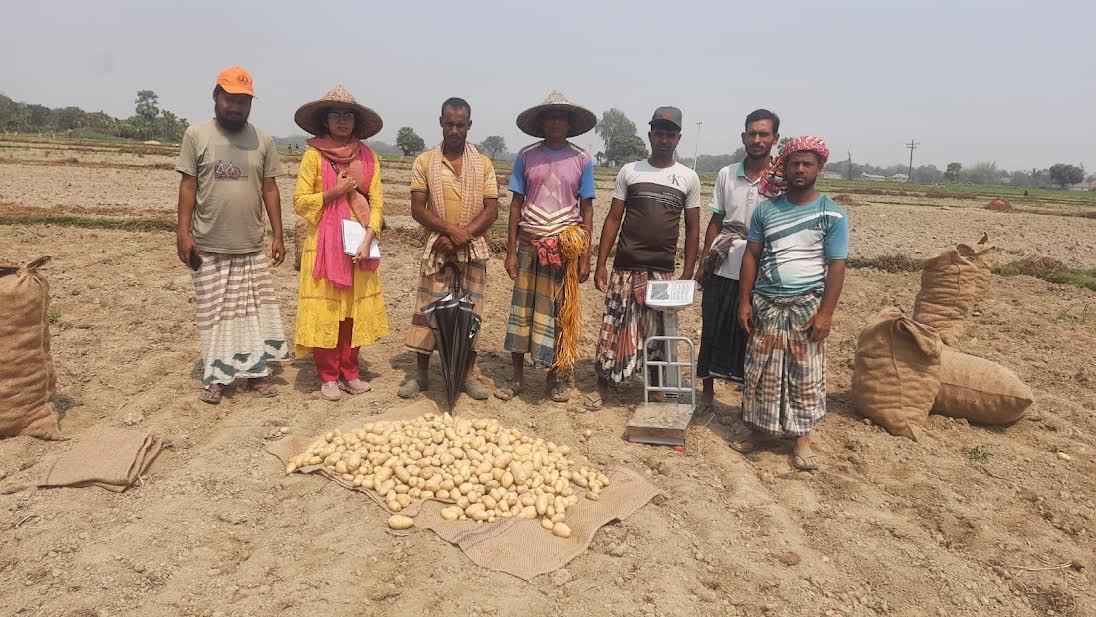News Flash

By Md Aynal Haque
RAJSHAHI, Oct 10, 2025 (BSS) - Dolomite has emerged as a game-changer for many farmers in the Rajshahi region, especially in the Barind tract, significantly increasing crop yields and improving soil health over the past few years.
Dolomite, a naturally occurring mineral composed of calcium magnesium carbonate, is widely used as a soil amendment to neutralize acidity -- a common issue in Barind's soils. By improving soil pH, dolomite enhances nutrient availability, particularly phosphorus, and supports beneficial microbial activity, all of which are vital for healthy plant growth.
Experts say that correcting soil acidity and promoting nutrient balance through dolomite application have led to marked improvements in agricultural productivity. As a result, farmers are seeing higher yields and greater financial returns.
Helal Uddin, 48, a farmer from Soronjai village in Tanore upazila, harvested 97 mounds of potatoes per bigha on his traditional plot. But from an adjacent experimental plot treated with dolomite and other inputs, he harvested 116 mounds -- a 20% increase.
During a recent farmers' field day held at Soronji playground, similar success stories were shared. Mainul Islam, 43, from the same village, reported harvesting 115 mounds of potatoes per bigha in an experimental plot compared to just 90 mounds from his regular practice. His chickpea yield doubled -- 13 mounds on the experimental plot versus six on his own field.
Ariful Islam of Pachandar village said he reaped nine mounds of lentils from the test plot, compared to six mounds from his traditional system. He described the combined dolomite and organic matter approach as cost-effective and sustainable.
In Gomastapur upazila, Abdul Moin, 56, saw similar benefits. He cultivated wheat on two bighas -- one traditional and one experimental. The plot treated with dolomite yielded 18 mounds, while the untreated one produced only 12.
These results were part of a series of field trials conducted in Rajshahi, Chapainawabganj, and Naogaon districts. The trials compared traditional farming practices with enhanced methods that used dolomite, organic fertilizers, and bio-pesticides.
According to the Soil Resource Development Institute (SRDI), dolomite helps create a soil environment that improves the effectiveness of chemical fertilizers while reducing environmental harm from fertilizer runoff. This leads to better nutrient uptake, healthier crops, and increased yields.
The SRDI's Rajshahi regional office has set up 164 demonstration plots under its project titled "Acidic Soil Management and Sustainable Crop Production through Climate-Smart Agriculture in Rajshahi and Rangpur Divisions, including the Madhupur Tract." The project also trained 970 sub-assistant agriculture officers and progressive farmers on soil management techniques.
SRDI provides location-specific guidance on soil amendments and fertilizer use through its Upazila Nirdeshika, helping farmers apply dolomite and other treatments effectively and sustainably.
Dr. Nurul Islam, Principal Scientific Officer at SRDI, said farmers participating in the project received comprehensive support including fertilizers, irrigation, labor, and technical guidance to manage one bigha of experimental crop land.
"Dolomite is a key tool for improving soil health in Rajshahi's High Barind Tract," Dr. Islam said. "Our goal is to increase average crop yields by addressing soil acidity and promoting Climate-Smart Agriculture (CSA), ensuring long-term agricultural resilience and productivity."
He emphasized that improving soil quality and fertility through sustainable practices not only boosts yields but also ensures that resources are preserved for future generations.